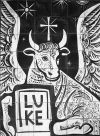
The Gospel of Luke
John the Baptist: Lk 7,18-35
Luke has a lengthy preparation for this scene of Jesus' response to John's request about his ministry (7,22). The evidence Jesus cites has already been provided. The background to the preceeding scene of the widow of Nain was Elijah's rasing of the dead child. Elijah is also the background for this discussion about the roles of John and Jesus.
The first statement made by Luke which is not in Matthew comes in verses 20-21 which make John's message more explicit. The second is the comment by the evangelist in verses 29-30.
The bracket at beginning and end that I suggested is the use of the full title "John the Baptist" which appears in verses 20 and 33. In verse 33, "the Baptist" is an addition by Luke not found in Matthew so this confirms the point.
The phrases which begin the three subdivisions are:
verse 18: "The disciples of John..."
verse 24: "When John's messengers..."
verse 31: "To what then will I compare...
These will form the basis for our reading.
Back now to the main page.
Witness to the Ministry of Jesus: Lk 7,18-23
This scene begins with John the Baptist sending from his prison (3,20) two disciples to enquire about the ministry of Jesus (7,19-20). Two disciples are necessary for a valid witness (Dt 19,15). Is Jesus really the one who is to come as proclaimed by John in 3,15-20?
The reply of Jesus indicates how he is fulfiling his programme descibed in the synagogue in Nazareth using the words of Isaiah 61, 4,18-19. To this can be added the raising of the widow's son just told.
Verse 23 is a beatitude, though there is no explicit promise as with those in chapter 6.
The Ministry of John the Baptist: Lk 7,24-30
John out in the desert clearly fulfills a more traditional image of a prophet than Jesus. Jesus clearly affirms the role of John the Baptist as his forerunner. This perhaps reflects a need of the early Church where there were still those who had had no more than John's baptism, Acts 19,3-4.
In verse 27, Luke gives the same composite quotation as Mark 1,2, coming from Malachi 3,1 and Isaiah 40,3. In chapter 3, Luke just quotes Isaiah 40 but more extensively (Is 40,3-5).
Verses 29-30 are a comment by the evangelist about the Pharisees rejection of John's message compared with his acceptance by the tax collectors. This recalls John's preaching in 3,10-14 especially with the question of the tax collectors in 3,12. Verse 30 is very strong on the Pharisee's rejection of God's plan. This will lead into the next scene when a Pharisee invites Jesus to a meal.
John and Jesus: Lk 7,31-35
The final part of this section bring together reactions to both John and Jesus. It might be described as trying to have it both ways. Luke makes the point more personal by speaking of wisdom's children instead of works as in Mt 11,19. Wisdom is open to those who search for her and the quotation from the Wisdom of Solomon is one of a number of similar statements.
Back now to the main page for the next episode.
